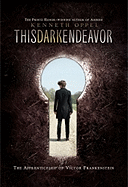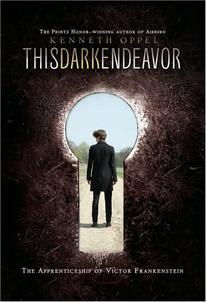
 Kenneth Oppel (the Silverwing Trilogy) imagines the shaping of Victor Frankenstein's psyche in a taut and chilling novel that serves as a brilliant prequel to Mary Shelley's Frankenstein. He keeps many of Shelley's major players: Elizabeth Lavenza, a cousin (consistent with the first edition of the novel) to the Frankensteins; Henry Clerval, Victor's close friend; and younger brothers Ernest and William Frankenstein. But Oppel also invents an identical twin, Konrad, born two minutes before Victor. The tension between the two 15-year-old brothers over their romantic feelings toward Elizabeth brings out the dark side in Victor.
Kenneth Oppel (the Silverwing Trilogy) imagines the shaping of Victor Frankenstein's psyche in a taut and chilling novel that serves as a brilliant prequel to Mary Shelley's Frankenstein. He keeps many of Shelley's major players: Elizabeth Lavenza, a cousin (consistent with the first edition of the novel) to the Frankensteins; Henry Clerval, Victor's close friend; and younger brothers Ernest and William Frankenstein. But Oppel also invents an identical twin, Konrad, born two minutes before Victor. The tension between the two 15-year-old brothers over their romantic feelings toward Elizabeth brings out the dark side in Victor.
Oppel begins the book with a play written by Clerval. In it, the twins track a monster, slay it to discover a beautiful girl within (played by Elizabeth), then Victor kills Konrad in order to secure the family fortune. With that brief staging, the author cleverly introduces the themes that run throughout the book. Victor loves his twin brother but also needs to feel superior to him, and this duality dogs his every step. One day, while Victor, Konrad and Elizabeth are horsing around, Elizabeth falls against some bookshelves that open a narrow entrance to a secret passage. In the bowels of the Chateau Frankenstein, they discover a library of forbidden texts that offers, among other things, the secret of alchemy and the Elixir of Life. When Konrad falls ill, Victor enlists Elizabeth's and Henry's help in attempting to discover the recipe for the Elixir of Life in order to save him. Their pursuit is the "dark endeavor" of the title. They submerge themselves (as Mary Shelley's Victor did) in the works of Cornelius Agrippa and Paracelsus in order to decode the Elixir's recipe. Their mission leads them to the laboratory of a hermit-like alchemist named Julius Polidori, and some spine-tingling adventures to retrieve the ingredients for the Elixir. They encounter the vulture-like Lammergeier, with its 10-foot wingspan, and a prehistoric coelacanth (their pursuit of the fish through tiny tunnels will make even hearty readers claustrophobic).
Along with the page-turning plot developments, Oppel probes the societal shifts in thinking in late 18th-century Switzerland. Konrad yearns to visit America; the French people have fomented a revolution; and scientific breakthroughs have begun to overshadow Roman Catholicism. When Victor, an atheist, worries that he could lose his brother to illness, he almost envies Elizabeth her devout beliefs. His thoughts as he observes her in the church expose the tug-of-war between fact and faith, in both religion and science: "Wine to blood. Lead to gold. Medicine dripped into my brother's veins. The transmutation of matter. Was it magic or science? Fantasy or truth?" The more haunting question plaguing Victor: Should we play God just because we can? Oppel succeeds in creating a complex character living in the 18th-century whose inner struggles will resonate profoundly with young men and women of modern times.--Jennifer M. Brown

